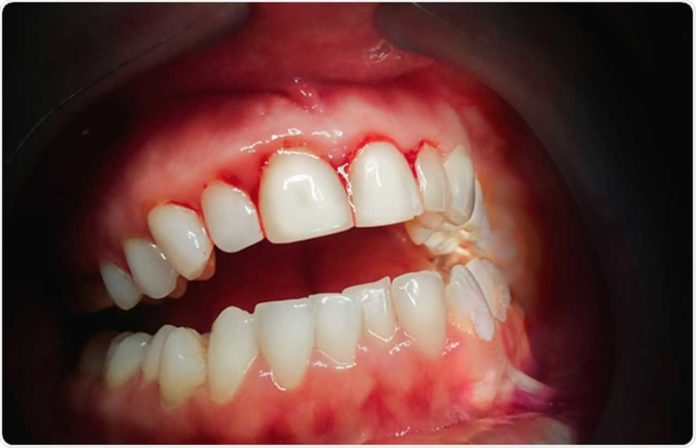If your gums are bleeding, it may be a sign of gingivitis. In such cases, patients are often advised to brushing and flossing twice a day.
But a new study by the University of Washington study suggests bleeding gums may be a sign you need more vitamin C in your diet.
The study’s lead author Philippe Hujoel said, “When you see your gums bleed, the first thing you should think about is not, I should brush more. You should try to figure out why your gums are bleeding. And vitamin C deficiency is one possible reason.”
Scientists studied published studies of 15 clinical trials in six countries, involving 1,140 predominantly healthy participants, and data from 8,210 U.S. residents surveyed in the Centers for Disease Control and Prevention’s Health and Nutrition Examination Survey. They found that bleeding of the gums on gentle probing, gingival bleeding tendency, bleeding in the eye, or retinal hemorrhaging was related to low vitamin C levels in the bloodstream. Furthermore, the scientists found that expanding the everyday intake of vitamin C in those people with low vitamin C plasma levels assisted with switching these bleeding issues.
Hujoel said, “Of potential relevance, who is also an adjunct professor of epidemiology in the UW School of Public Health, both a gum bleeding tendency and retinal bleeding could be a sign of general trouble in one’s microvascular system, of a microvascular bleeding tendency in the brain, heart, and kidneys.”
“The study does not imply that successful reversing of an increased gingival bleeding tendency with vitamin C will prevent strokes or other serious health outcomes. However, the results do suggest that vitamin C recommendations designed primarily to protect against scurvy — a deadly disease caused by extremely low vitamin C levels — are too low and that such a low vitamin C intake can lead to a bleeding tendency, which should not be treated with dental floss.”
“People attempt to keep an eye on their vitamin C intake through the incorporation of non-processed foods such as kale, peppers, or kiwis into your diet, and if you can’t find palatable foods rich in vitamin C to consider a supplement of about 100 to 200 milligrams a day.”
“If someone is on a specialized diet, such as a paleo diet, it’s important that they take a look at their vitamin C intake, Hujoel said. “Vitamin C-rich fruits such as kiwis or oranges are rich in sugar and thus typically eliminated from a low-carb diet.”
“This avoidance may lead to a vitamin C intake that is too low and is associated with an increased bleeding tendency. People who exclusively eat lean meats and avoid offal, the vitamin-rich organ meats, maybe at particularly high risk for a low vitamin C intake.”
However, this connection somehow got lost in dental conversations around bleeding gums.
The study authors write: “A default prescription of oral hygiene and other periodontal interventions to ‘treat’ microvascular pathologies, even if partially effective in reversing gingival bleeding as suggested in this meta-analysis, is risky because it does not address any potential morbidity and mortality associated with the systemic microvascular-related pathologies.”
Co-authors include Tomotaka Kato, Department of Oral Health Sciences, UW School of Dentistry; Isabel Hujoel, Division of Gastroenterology and Hepatology, Mayo Clinic; and Margaux L.A. Hujoel, Department of Biostatistics, Harvard T.H. Chan School of Public Health.
Journal Reference:
- Philippe P Hujoel et al. Bleeding tendency and ascorbic acid requirements: systematic review and meta-analysis of clinical trials. DOI: 10.1093/nutrit/nuaa115
